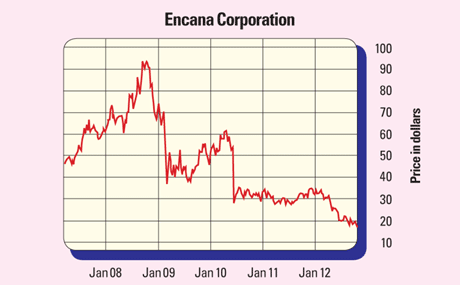Get the latest financial news, insights and expert analysis from our award-winning MoneyWeek team, to help you understand what really matters when it comes to your finances.
You are now subscribed
Your newsletter sign-up was successful
Want to add more newsletters?

Twice daily
MoneyWeek
Get the latest financial news, insights and expert analysis from our award-winning MoneyWeek team, to help you understand what really matters when it comes to your finances.

Four times a week
Look After My Bills
Sign up to our free money-saving newsletter, filled with the latest news and expert advice to help you find the best tips and deals for managing your bills. Start saving today!
The era of cheap fuel has ended and many countries are turning their backs on nuclear power. Yet US natural gas trades at ten-year lows and (based on energy content) at an equivalent of $15 per barrel, compared to $100 for oil. Why? Mild winter temperatures, record shale gas production and a lack of export options are the main reasons American inventories have swollen and prices have dropped. But this won't last.
Domestic gas consumption is rising and is expected to reach 30%-35% (from 25% today) of North America's aggregate energy needs by 2030.
Meanwhile, the best solution for the export bottleneck is to build appropriate pipelines to transport trapped gas from, say, the Rockies to the coast, convert it into liquified natural gas (LNG) and ship it overseas to be sold. That's why the US Department of Energy is in the process of approving eight applications for the development of new gas export docks, which together would account for 18% of the country's production.
MoneyWeek
Subscribe to MoneyWeek today and get your first six magazine issues absolutely FREE

Sign up to Money Morning
Don't miss the latest investment and personal finances news, market analysis, plus money-saving tips with our free twice-daily newsletter
Don't miss the latest investment and personal finances news, market analysis, plus money-saving tips with our free twice-daily newsletter
One company well placed to benefit is Encana, Canada's biggest natural gas producer. The firm owns one of the largest resource portfolios on the continent, including a land bank of 11.7 million acres, stretching from northeast British Columbia to Texas and Louisiana. Together its proved and contingent reserves equate to a reserve life of about 30 years at current output rates.
Encana (NYSE: ECA), rated OUTPERFORM by Credit Suisse

I estimate these assets are worth around $27.4bn in total. After deducting net debt of $8.3bn and a $1bn pension deficit, I get a fair value of about $24.50 per share. Reassuringly for income-seekers, the board is paying an uncovered dividend of 80 cents (a 4.1% yield) as a sign of its confidence in the long-term outlook. If US gas prices were to migrate towards higher overseas levels, Encana's valuation could double.
This isn't a stock for widows and orphans. Encana is exposed to the dangers inherent in the oil and gas sector, including volatile commodity prices, forex risks, the speculative nature of drilling, rising input costs, tighter legislation and unfavourable weather conditions. Nonetheless, the risk/reward profile is attractive for the thicker-skinned investor.
Investment bank Credit Suisse has a price target of $27 and quarterly results are scheduled for 17 February.
Rating: BUY at $19.50
Update: Robert Wiseman (LSE: RWD) - In the absence of a competing bid, Mller now looks almost certain to acquire RWD for 390p a share in cash. I think it's time to sell up and accept the offer prior to the first closing date of 1pm (London time) on 6 February. Paul Hill owns shares in RWD.
Paul Hill also writes a weekly share-tipping newsletter, Precision Guided Investments. See www.moneyweek.com/PGI , or phone 020-7633 3634 for more.
Get the latest financial news, insights and expert analysis from our award-winning MoneyWeek team, to help you understand what really matters when it comes to your finances.
Paul gained a degree in electrical engineering and went on to qualify as a chartered management accountant. He has extensive corporate finance and investment experience and is a member of the Securities Institute.
Over the past 16 years Paul has held top-level financial management and M&A roles for blue-chip companies such as O2, GKN and Unilever. He is now director of his own capital investment and consultancy firm, PMH Capital Limited.
Paul is an expert at analysing companies in new, fast-growing markets, and is an extremely shrewd stock-picker.
-
 Can mining stocks deliver golden gains?
Can mining stocks deliver golden gains?With gold and silver prices having outperformed the stock markets last year, mining stocks can be an effective, if volatile, means of gaining exposure
-
 8 ways the ‘sandwich generation’ can protect wealth
8 ways the ‘sandwich generation’ can protect wealthPeople squeezed between caring for ageing parents and adult children or younger grandchildren – known as the ‘sandwich generation’ – are at risk of neglecting their own financial planning. Here’s how to protect yourself and your loved ones’ wealth.